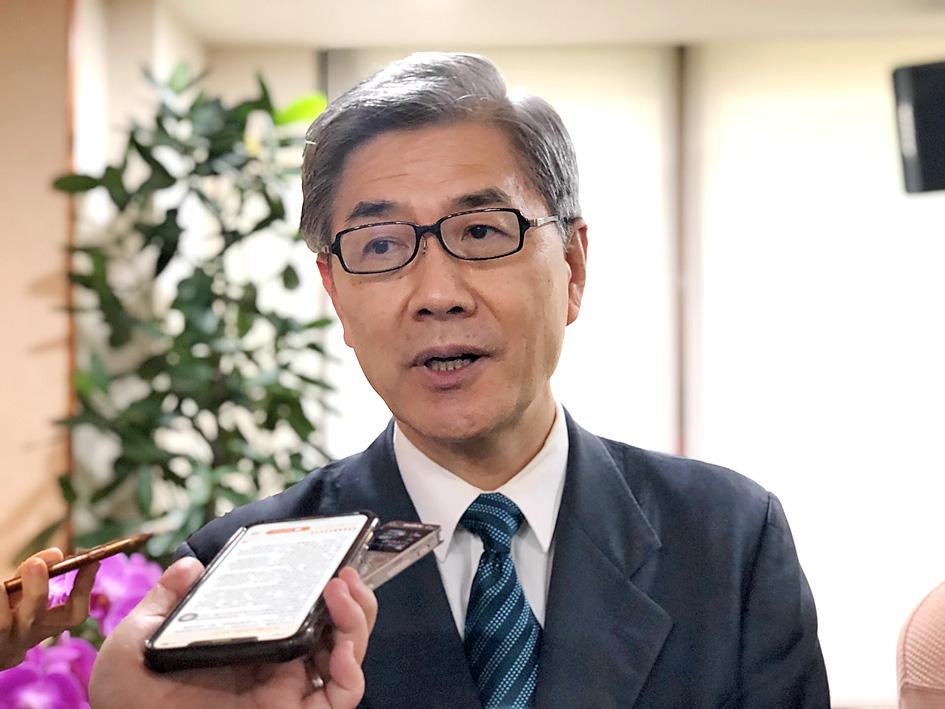The Financial Supervisory Commission (FSC) would set up new guidance by the end of August to boost corporate governance, insurers’ solvency, green financing, financial technology, the trust industry and information security, new FSC Chairman Thomas Huang (黃天牧) said yesterday.
“Corporate governance has been improved in terms of compliance and shareholding disclosure with former chairman Wellington Koo (顧立雄) at the helm. It is time to move to the next phase to focus on companies’ roles in sustainable development,” Huang told a news conference in New Taipei City.
The commission would also set policies to incentivize companies to increase green financing and adopt the Equator Principle, a set of voluntary guidelines for companies to assess environmental risks in financing, he said.

Photo: Kelson Wang, Taipei Times
The commission would review its regulatory sandbox program and might consider making some changes in the rules to enable more start-ups or technology firms to use the sandbox, Huang said, adding that he would hold a meeting with representatives of the technology industry next month.
While Koo aimed to conduct 10 experiments in the sandbox per year, Huang would later announce the key performance indicators he uses to evaluate if the program works, he said.
As insurance regulators worldwide last year agreed to finalize a global supervisory framework at the annual International Association of Insurance Supervisors conference, the commission would keep pace by introducing the Insurance Capital Standard (ICS) version 2.0 in Taiwan, Huang said.
The commission would ask all insurers to re-evaluate their assets and liabilities based on the ICS version 2.0 from this year to 2024, after which the commission would determine whether to implement the global standards with moderate modifications, he said.
“Foreign companies would continue investing in Taiwan, while some local insurers would also expand their operations to Southeast Asia. It would be beneficial for them to adopt the international standards,” he said.
With the coronavirus outbreak easing in Taiwan, financial companies could themselves decide whether to keep their contingency measures to prevent infections, such as having staff work in separate locations or asking some to work from home, Huang said.
“We have three focuses for companies amid the pandemic: whether their employees are safe and healthy, whether their operations remain normal and whether the companies’ practices are helpful to market stability,” he said.
Huang said he expects some companies to continue holding videoconferences or having some employees telework even though the spread of the virus slows down, as such practices are deemed convenient and cost-saving, he added.

NEW IDENTITY: Known for its software, India has expanded into hardware, with its semiconductor industry growing from US$38bn in 2023 to US$45bn to US$50bn India on Saturday inaugurated its first semiconductor assembly and test facility, a milestone in the government’s push to reduce dependence on foreign chipmakers and stake a claim in a sector dominated by China. Indian Prime Minister Narendra Modi opened US firm Micron Technology Inc’s semiconductor assembly, test and packaging unit in his home state of Gujarat, hailing the “dawn of a new era” for India’s technology ambitions. “When young Indians look back in the future, they will see this decade as the turning point in our tech future,” Modi told the event, which was broadcast on his YouTube channel. The plant would convert

‘SEISMIC SHIFT’: The researcher forecast there would be about 1.1 billion mobile shipments this year, down from 1.26 billion the prior year and erasing years of gains The global smartphone market is expected to contract 12.9 percent this year due to the unprecedented memorychip shortage, marking “a crisis like no other,” researcher International Data Corp (IDC) said. The new forecast, a dramatic revision down from earlier estimates, gives the latest accounting of the ongoing memory crunch that is affecting every corner of the electronics industry. The demand for advanced memory to power artificial intelligence (AI) tasks has drained global supply until well into next year and jeopardizes the business model of many smartphone makers. IDC forecast about 1.1 billion mobile shipments this year, down from 1.26 billion the prior

People stand in a Pokemon store in Tokyo on Thursday. One of the world highest-grossing franchises is celebrated its 30th anniversary yesterday.

Zimbabwe’s ban on raw lithium exports is forcing Chinese miners to rethink their strategy, speeding up plans to process the metal locally instead of shipping it to China’s vast rechargeable battery industry. The country is Africa’s largest lithium producer and has one of the world’s largest reserves, according to the US Geological Survey (USGS). Zimbabwe already banned the export of lithium ore in 2022 and last year announced it would halt exports of lithium concentrates from January next year. However, on Wednesday it imposed the ban with immediate effect, leaving unclear what the lithium mining sector would do in the